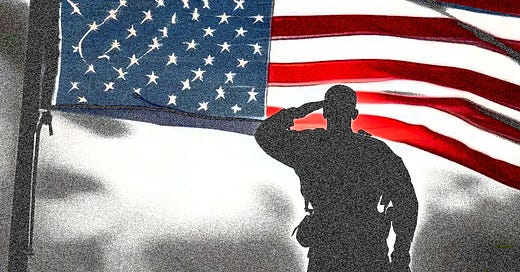How deep is a soldier’s loyalty to the commander in chief?
Trump's plans to use the military at home will create dangerous situations
By Mike Sorrell
Several decades ago, a neighbor and I were talking about the apparent aimlessness of some of the teenaged boys growing up around us. I said I had suggested to a couple of them that they join the military. See the world. Develop discipline. Grow up.
The neighbor replied that he never voices his opinion as to whether a young person should join or not join the military.
“I just say, ‘If you join the military, you have decided you will kill anyone your president tells you to kill.’”
My neighbor was a retired Army colonel.
The conversation took place before the wars in Afghanistan and Iraq and after the Vietnam War, our generation’s war.
On January 20, 2025, Donald J. Trump will raise his hand, take an oath and become, for the second time, president of the United States and commander in chief of the United States military.
What wars will he embrace? Which will he choose not to get into?
Trump has indicated he does not want the United States to continue the aggressive, forever-war policies carried out for decades by previous administrations and the Department of Defense.
Who can argue with Trump’s overall point, however vague, that the nation should engage in fewer foreign wars?
However, young men and women who in coming months choose to enlist in the military should not do so with the expectation that Trump will usher in an era of peace.
In fact, Trump appears itching to take the U.S. military into the streets of this nation to enforce his pre-election promise to deport a million or more undocumented immigrants. Whether or not one wants to call that a “war,” Trump’s purpose would be to put the nation’s military force – dedicated and trained to fight in foreign wars – into American communities. That is an outrageous and dangerous idea that’s also not a role current U.S. military leaders want to play. Perhaps that’s why the incoming Trump administration is also talking about creating a panel of former military leaders that would get rid of generals and admirals that don’t march in step with Trump’s proposal to engage in domestic military operations.
As for the ordinary soldiers down in the ranks, what role would they play in the Trump administration’s effort to deport a million undocumented immigrants? The common, relatively low-ranking soldiers are always up front in any action, of course.
If individual or small-group confrontations take place, some immigrants are likely to surrender peacefully and get processed on their way out of the country. If so, will U.S. soldiers guard them in concentration camps while immigrants await deportation? Will soldiers be knocking on doors to put people in those concentration camps (or whatever word the Trump administrations uses for those jails)?
A million different situations would, of course, lead to at least some violent confrontations.
Will soldiers find themselves forced to make split-second decisions when someone with a weapon seems intent on shooting them? Law enforcement officers understand that can happen on any given day or night on the streets of America. That is not the traditional role of the American miliary, however.
What if the commander in chief issues an order to shoot-to-kill demonstrators when the commander in chief considers them “out of control”?
Given what's unfolding as Trump moves to overhaul the mission of the Defense Department, any young person who thinks about joining the military must ask himself or herself a question: “Are you willing to kill anyone your president tells you to kill?”



